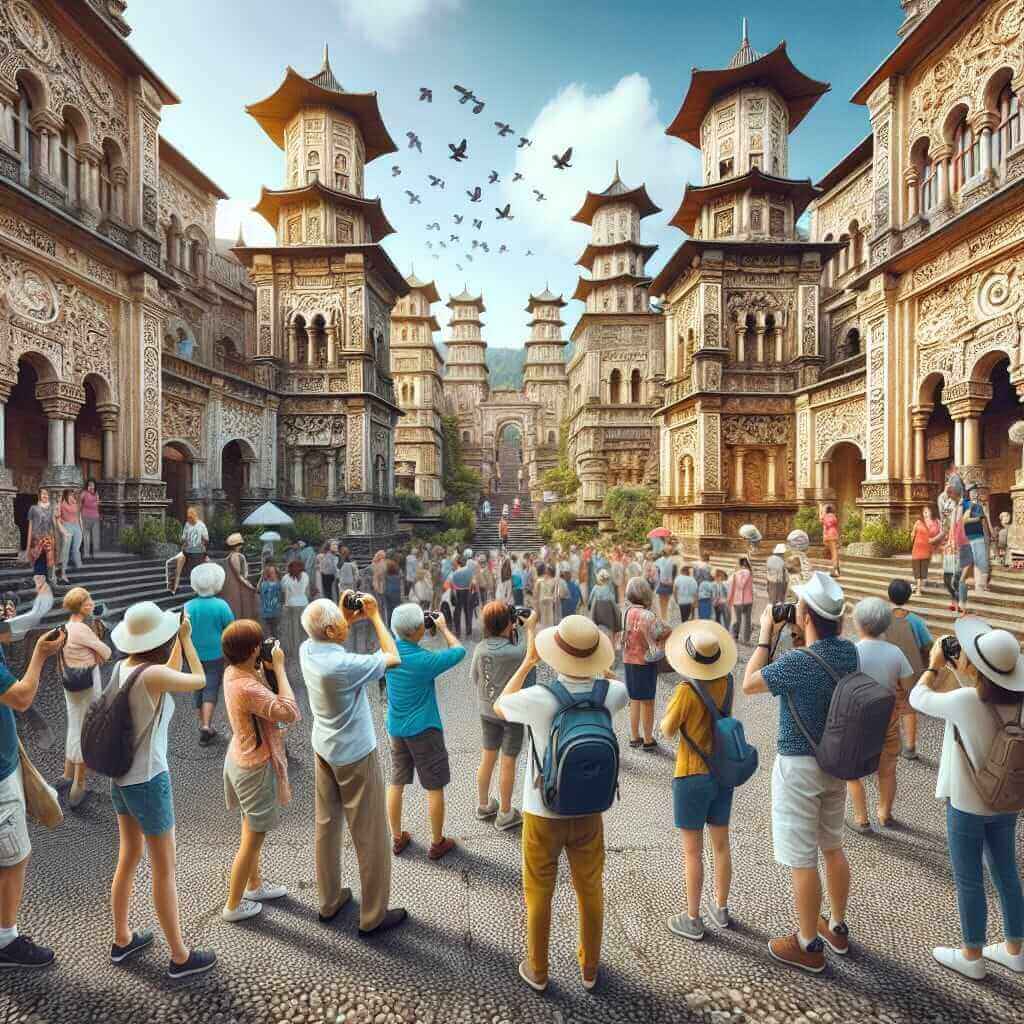The subject of “The importance of preserving cultural heritage” is a prominent topic in the IELTS Writing Task 2. This essay prompt often appears in various forms, focusing on the necessity of protecting cultural heritage sites, the benefits of conserving traditions, or the balance between modernization and cultural preservation.
Given its relevance, it is critical for IELTS candidates to understand the topic thoroughly. Keywords such as “cultural traditions,” “heritage conservation,” “modernization,” and “historical sites” often form the backbone of these discussions. Let’s explore a sample question that reflects this topic effectively:
Sample Questions:
- “Some people believe that preserving cultural heritage is crucial for a nation’s identity. To what extent do you agree or disagree?”
- “In an era of rapid globalization, some argue that preserving cultural heritage is more important than ever. Discuss both views and give your opinion.”
- “Traditional customs are being eroded by modern technology. What are the reasons for this, and how can we ensure that cultural heritage is preserved?”
Chosen Question and Analysis
For this exercise, we will focus on the second sample question:
Question: “In an era of rapid globalization, some argue that preserving cultural heritage is more important than ever. Discuss both views and give your opinion.”
Analysis:
- Task Requirement: Address both perspectives on the importance of preserving cultural heritage in the context of globalization, and provide your personal opinion.
- Structure: Introduction, discussion of both views, your opinion, conclusion.
Sample Essay
Introduction
In the contemporary era marked by the forces of globalization, the preservation of cultural heritage has elicited widespread debate. While some contend that globalization necessitates the conservation of cultural heritage more than ever before, others believe that forward-looking integration holds more significance. This essay will discuss both perspectives and argue that safeguarding cultural heritage is essential to maintain a nation’s identity and diversity in a globalized world.
Body Paragraph 1: The Importance of Preserving Cultural Heritage
Proponents of cultural heritage conservation argue that it is vital for preserving a nation’s identity. Cultural heritage, encompassing tangible artifacts and intangible traditions, forms the bedrock of a society’s history and values. For instance, UNESCO World Heritage Sites often become symbols of national pride and historical continuity. By preserving such heritage, societies can foster a sense of belonging and continuity amidst the rapid changes propelled by globalization. Furthermore, cultural heritage strengthens communal ties and offers educational opportunities for future generations to learn about their origins and shared values. This educational aspect is crucial in developing a well-rounded, culturally aware population.
Body Paragraph 2: The Argument for Embracing Globalization
On the contrary, some believe that globalization should take precedence, advocating that modernization and global integration necessitate a more forward-thinking approach. They argue that concentrating too heavily on preserving the past might hinder progress and innovation. In an interconnected world, prioritizing economic development, technological advancement, and cultural exchange can lead to a more prosperous and unified global society. For example, proponents highlight that the embrace of new technologies and practices can enrich and even rejuvenate certain aspects of cultural heritage, making them more accessible and relatable to younger generations.

Personal Opinion
In my opinion, while modernization holds undeniable benefits, the preservation of cultural heritage remains paramount. Cultural heritage is irreplaceable; once lost, it can never be wholly reclaimed. Therefore, efforts to conserve historical sites, traditions, and languages are not only acts of remembrance but also crucial investments in cultural diversity and societal health. Globalization should not lead to homogenization; instead, it should create avenues for mutual respect and the appreciation of different cultures.
Conclusion
In conclusion, the debate between the preservation of cultural heritage and the embrace of globalization is multifaceted. While the integration of modern practices is essential for progress, protecting cultural heritage ensures the enduring legacy and identity of each nation. Thus, a balanced approach that integrates both perspectives can foster a more inclusive and diverse global society.
Word Count: 394 words
Key Considerations for Writing
Vocabulary and Grammar:
- Vocabulary: Ensure to use contextually accurate and varied vocabulary such as “preserve,” “conservation,” “globalization,” “heritage,” and “identity.”
- Grammar: Employ a range of complex sentences and conditional structures to enhance the essay’s coherence and depth.
- Example: “By preserving such heritage, societies can foster a sense of belonging and continuity amidst the rapid changes propelled by globalization.”
Important Vocabulary:
- Heritage (noun): /ˈherɪtɪdʒ/ – properties or traditions handed down through generations.
- Preserve (verb): /prɪˈzɜːv/ – to maintain something in its original state.
- Globalization (noun): /ˌɡləʊbəlaɪˈzeɪʃən/ – the process of interaction and integration among people, companies, and governments worldwide.
- Homogenization (noun): /həˌmɒdʒənaɪˈzeɪʃən/ – the process of making things similar or uniform.
- Tangible (adjective): /ˈtændʒəbl/ – perceptible by touch, clearly seen or identifiable.
- Intangible (adjective): /ɪnˈtændʒəbl/ – unable to be touched; not having physical presence.
- Catalyst (noun): /ˈkætəlɪst/ – something that triggers change or action.
Conclusion
Preserving cultural heritage is a central theme in the IELTS Writing Task 2, often appearing in various forms. Understanding both the pros and cons of this subject, alongside cultivating a balanced viewpoint, can immensely benefit candidates. Other related questions to practice include:
- “What measures can be taken to preserve cultural heritage in your country?”
- “Discuss the role of technology in the preservation of cultural heritage.”
In-depth analysis, strong vocabulary usage, and a coherent structure are vital for achieving a high band score in the IELTS Writing Task 2 essay.